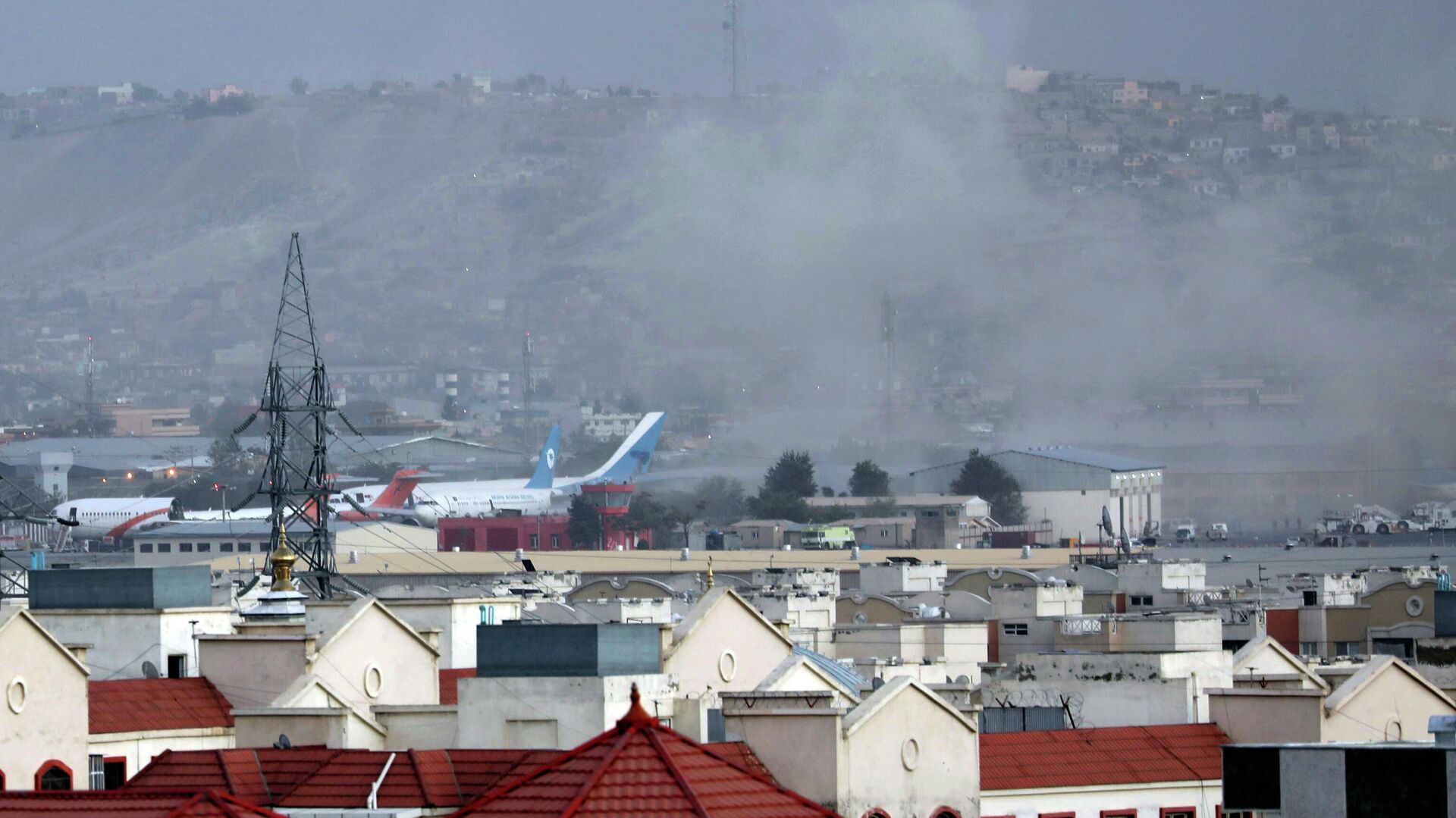https://sputnikglobe.com/20220425/top-iranian-general-claims-us-affiliated-terrorists-behind-recent-bomb-blasts-in-afghanistan-1095030930.html
Top Iranian General Claims US-Affiliated Terrorists Behind Recent Bomb Blasts in Afghanistan
Top Iranian General Claims US-Affiliated Terrorists Behind Recent Bomb Blasts in Afghanistan
Sputnik International
When asked last week if Daesh* was getting “stronger” in Afghanistan, US State Department spokesperson Ned Price avoided giving a direct response, stating... 25.04.2022, Sputnik International
2022-04-25T10:31+0000
2022-04-25T10:31+0000
2023-02-10T09:05+0000
iran
afghanistan
us
taliban
ebrahim raisi
isis
daesh
https://cdn1.img.sputnikglobe.com/img/07e6/01/01/1091967656_0:323:3067:2048_1920x0_80_0_0_2f880e64653fe7ad58ca623e97a9b86b.jpg
The chief of staff of the Iranian Armed Forces has claimed that a spate of deadly blasts that rocked the Afghan cities of Mazar-e-Sharif and Kunduz last week were carried out by terrorists and mercenaries “affiliated” with the US, Iran's Press TV reported on Monday.The Iranian general further claimed that the terrorist networks behind last week’s attacks on schools and mosques were following the “evil strategy of the White House and other enemies of the Grand Prophet of Islam”.A bomb attack on a mosque in Kunduz on 22 April left 33 people dead and 43 injured, as per a statement posted on Twitter by the Taliban’s deputy information minister, Zabiullah Mujahid.Mujahid said that the “perpetrators” of the attack would be brought to justice.No group has claimed responsibility for the attack so far.On 21 April, a suicide bombing at a Shia Hazara mosque gathering in the northern city of Mazar-e-Sharif, the capital of Balkh province, left at least 25 dead, as per the Taliban**.The proscribed terrorist group Daesh reportedly claimed responsibility for the attack, in which most of the dead were Shiite Muslims. Daesh has a history of targeting Shias and those who follow Sufism (seeking intercession with God through saints) within Islam, considering them as heretics.On 19 April, a twin bomb attack at a boys’ school in a predominantly Shiite neighbourhood of Kabul left six dead and 25 injured. Many of the victims in the attack were school-goers, as per local officials.While the Taliban has claimed that they have almost eliminated the Daesh from Afghanistan, Iran has doubted the contention.Zahra Ershadi, Iran’s ambassador and deputy permanent representative to the United Nations, warned on 23 April that Daesh has “intensified” terrorist attacks in Afghanistan.Iran’s President Dr Seyyed Ebrahim Raisi has also indirectly blasted the US for the increasing terrorism in the country.* Daesh (also known as ISIS/ISIL/IS/Islamic State) is a terrorist group banned in Russia and many other countries** Under UN sanctions for terrorist activities
iran
afghanistan
Sputnik International
feedback@sputniknews.com
+74956456601
MIA „Rosiya Segodnya“
2022
News
en_EN
Sputnik International
feedback@sputniknews.com
+74956456601
MIA „Rosiya Segodnya“
Sputnik International
feedback@sputniknews.com
+74956456601
MIA „Rosiya Segodnya“
iran, afghanistan, us, taliban, ebrahim raisi, isis, daesh
iran, afghanistan, us, taliban, ebrahim raisi, isis, daesh
Top Iranian General Claims US-Affiliated Terrorists Behind Recent Bomb Blasts in Afghanistan
10:31 GMT 25.04.2022 (Updated: 09:05 GMT 10.02.2023) When asked last week if Daesh* was getting “stronger” in Afghanistan, US State Department spokesperson Ned Price avoided giving a direct response, stating “…we’re extremely concerned about the recent rise of violence in Afghanistan and call for an end to these cowardly attacks and for the perpetrators to be brought to justice”.
The chief of staff of the
Iranian Armed Forces has claimed that a spate of deadly blasts that rocked the Afghan cities of Mazar-e-Sharif and Kunduz last week were carried out by terrorists and mercenaries “affiliated” with the US, Iran's Press TV reported on Monday.
"Adoption of expedient measures as well as serious and practical steps... to discover the reasons and causes of such disasters in addition to identification and categorical punishment of those groups and elements that are behind them is a necessity”, Major General Mohammad Hossein Baqeri said in a message.
The Iranian general further claimed that the terrorist networks behind last week’s attacks on schools and mosques were following the “evil strategy of the White House and other enemies of the Grand Prophet of Islam”.
A bomb attack on a mosque in Kunduz on 22 April left 33 people dead and 43 injured, as per a statement posted on Twitter by the Taliban’s deputy information minister, Zabiullah Mujahid.
Mujahid said that the “perpetrators” of the attack would be brought to justice.
No group has claimed responsibility for the attack so far.
On 21 April, a suicide bombing at a Shia Hazara mosque gathering in the northern city of Mazar-e-Sharif, the capital of Balkh province, left at least 25 dead, as per the Taliban**.
The proscribed terrorist group Daesh reportedly claimed responsibility for the attack, in which most of the dead were Shiite Muslims.
Daesh has a history of targeting Shias and those who follow Sufism (seeking intercession with God through saints) within Islam, considering them as heretics.
On 19 April, a twin bomb attack at a boys’ school in a predominantly Shiite neighbourhood of Kabul left six dead and 25 injured. Many of the victims in the attack were school-goers, as per local officials.
While the
Taliban has claimed that they have almost eliminated the Daesh from Afghanistan, Iran has doubted the contention.
Zahra Ershadi, Iran’s ambassador and deputy permanent representative to the United Nations, warned on 23 April that Daesh has “intensified” terrorist attacks in Afghanistan.
She blamed “foreign actors” for Daesh’s growing activity in the Asian nation, particularly the alleged policy of “transferring terrorists” from Iran and Syria to Afghanistan, a reference to the US.
Iran’s President Dr Seyyed Ebrahim Raisi has also indirectly blasted the US for the increasing terrorism in the country.
“Condemning the terrorist attacks on several schools in Afghanistan and offering his condolences to the families of the victims of the incident, Dr Seyyed Ebrahim Raisi said that in addition to terrorists, the responsibility for these incidents lies with the countries that have played the most important role in undermining the security and destabilising the country through irresponsible interventions”, an official statement released after a Cabinet meeting on 20 April said.
* Daesh (also known as ISIS/ISIL/IS/Islamic State) is a terrorist group banned in Russia and many other countries
** Under UN sanctions for terrorist activities



